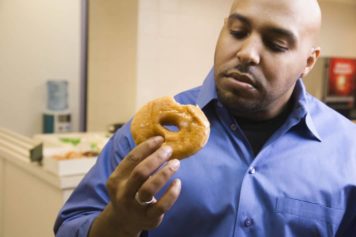Receiving a substantial amount of rest each night may better prepare you for the fight against obesity.
Researches have concluded that those who don’t get enough rest are more likely to experience a high desire for sugary and salty foods. Sleepless nights equal fatty cravings, a certain link scientists have found between tired brains and obesity rates.
Scientists at St. Luke’s Roosevelt Hospital Center and Columbia University have proven that junk food is more appetizing to tired brains. Researchers discovered that when normal weight volunteers looked at unhealthy foods during a period of sleep deprivation, the reward centers in their brain were very active. When these same individuals looked at fattening foods after a good night’s rest, reward centers of the brain were less active.
This study was conducted using 25 male and female volunteers. Each person was shown images of healthy and unhealthy foods after five nights of sleep restriction and five nights of regular sleep. During five nights of sleep restriction, participants were allowed no more than four hours of sleep per night. During five nights of regular sleep, up to nine hours was permissible.
Unhealthy images shown to participants were poor nutrient foods such as candy and pizza. Nutrient rich foods such as oatmeal, fruits and vegetables, were among the healthy food images. After restricted sleep, participants desired the more fattening and salty food images. Principal investigator Dr. Marie-Pierre St-Onge, a Research Associate with the New York Obesity Research Center, used this study to link inadequate rest to appetite regulation and obesity.
The study was presented at SLEEP 12, the 26Th annual meeting of the Associated Professional Sleep Societies (APSS) in Boston, Massachusetts.

